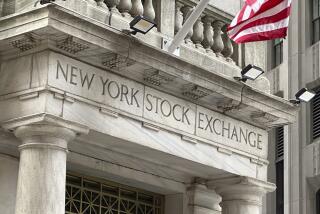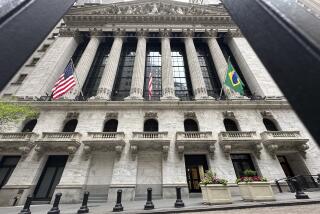Banks may play down losses in accounting
- Share via
NEW YORK — Wall Street’s premier investment banks are supposed to tell investors this week how badly they’ve been burned by the turmoil in the financial markets.
But will they tell the whole story?
The question preoccupies Wall Street as four giants -- Bear Stearns Cos., Lehman Bros. Holdings Inc., Morgan Stanley and Goldman Sachs Group Inc. -- prepare to report quarterly financial results. Lehman will report on Tuesday, Morgan on Wednesday, and Bear and Goldman on Thursday.
Skeptics say the banks could take advantage of accounting rules to play down large potential losses in beaten-down mortgage securities, thus propping up their earnings.
“The current accounting standards give those preparing financial statements great latitude and tremendous use of judgment in coming up with the numbers,” said Lynn Turner, former chief accountant at the Securities and Exchange Commission.
“That latitude and judgment can be used very handily to misrepresent the information provided to investors.”
It’s no secret, of course, that the banks have been hit hard by the upheaval that began in sub-prime mortgages and spread to global credit markets.
The lucrative booms in private equity, hedge funds and corporate mergers have been thrown into jeopardy. The banks are having trouble unloading more than $300 billion in private-equity debt. And large segments of the credit markets remain congealed.
Though they rallied last week, the banks’ stock prices are way off their highs. Shares of Bear Stearns, which has been at the center of the sub-prime storm, are down almost one-third from their mid-January peak.
Analysts lowered fiscal third-quarter earnings estimates for several banks as the credit crunch set in, data from Thomson Financial show.
In early June, Bear was expected to earn $3.43 a share, a 14% jump from the $3.02 it earned a year earlier. Now, profit is projected to tumble 41% to $1.78, according to Thomson.
The weakness is centered in the fixed-income and investment-banking divisions.
Revenue at Bear’s fixed-income unit is expected to fall 46% from a year ago, with investment banking off 11%, according to Brad Hintz, an analyst at Sanford C. Bernstein & Co., a New York research firm.
What remains to be seen, however, is whether the banks will significantly write down the values of sub-prime and other troubled securities on their books.
A write-down -- essentially an acknowledgment that an asset is no longer worth the price for which it was bought -- directly lowers profit. If a batch of mortgage bonds, for example, is now worth only 90 cents on the dollar, the bank would write off the remaining 10 cents. Write-offs caused by the current turmoil could total hundreds of millions of dollars.
Indeed, that process has already begun. In a regulatory filing on Friday, Merrill Lynch & Co. said it had marked down sub-prime-related securities and that its third-quarter earnings would be nicked as a result.
In theory, companies must quickly write off most investment-related losses. But accounting rules provide wide leeway in determining the value of some assets.
It’s easy to gauge the value of stocks or government bonds, which trade on the open market. But it’s tough to value esoteric securities, such as complex mortgage bonds and so-called derivatives.
That’s especially true now because trading in such instruments has virtually shut down amid the credit crunch.
In such cases, firms use highly subjective estimates -- or “best guesses,” Hintz calls them -- to value their holdings.
Bottom line: The firms could write down these securities significantly -- or barely.
At the five largest investment banks, about $149 billion, or 9% of total assets, employ these estimates, according to Hintz.
Write-offs depend partly on whether the losses are temporary or permanent, said Robert Willens, an accounting expert at Lehman. Losses caused by brief market pullbacks don’t have to be written off, he said.
Willens thinks the banks will limit their third-quarter write-offs on the theory that the credit markets will recover.
“I don’t think there are going to be huge write-offs,” Willens said. “I don’t think [the banks] have gotten to the point where they’re prepared” to concede that the losses are permanent.
Based on conversations they have had with people on Wall Street, Turner and Willens said several banks have discussed using a common valuation approach and divulging write-offs at the same time. The men didn’t know whether that would happen in time for this week’s reports.
Others think the banks will be forthcoming, in part because investors are paying close attention.
“There’s definitely going to be a higher level of scrutiny right now from analysts who are trying to assess the extent [of] losses,” said Nathan Powell, an analyst at RiskMetrics Group.
In a research note Thursday, Hintz also predicted that banks would be honest.
“Concerns of a ‘valuation conspiracy’ by the securities firms seem to us unfounded,” Hintz told investors.
--
More to Read
Inside the business of entertainment
The Wide Shot brings you news, analysis and insights on everything from streaming wars to production — and what it all means for the future.
You may occasionally receive promotional content from the Los Angeles Times.










